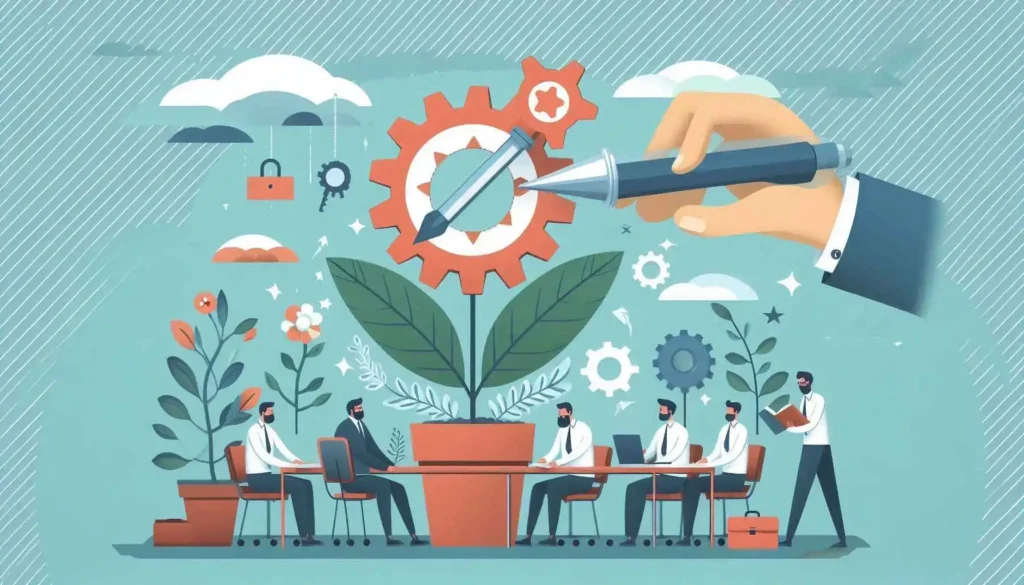
Top Soft Skills to Succeed in the Corporate World
Beyond the Resume: The Soft Skills That Propel You Up the Corporate Ladder
Introduction: Why Soft Skills Matter in Career Advancement
In today’s competitive professional landscape, technical expertise and a strong resume are undoubtedly important. They help you land the job and perform your core duties. However, ask any senior leader or HR professional, and they’ll tell you that the real differentiators – the skills that help individuals move from contributor to leader, up through management ranks – are often found not in a checklist of software proficiency, but in the realm of “soft skills.”
Soft skills are the interpersonal attributes, communication styles, and personal habits that define how you interact with others and navigate the complexities of the workplace. As you ascend the corporate ladder, your responsibilities shift from primarily individual tasks to influencing, leading, collaborating, and dealing with ambiguity. At these higher levels, your ability to connect with people, manage relationships, handle pressure, and communicate effectively becomes paramount.
Think of technical skills as the engine of a car – necessary to move. But soft skills are the steering wheel, brakes, and navigation system – essential for guiding that power effectively, avoiding collisions, and reaching your destination.
Developing and honing these soft skills isn’t just beneficial; it’s often critical for sustained career growth. They build trust, foster collaboration, enable effective leadership, and make you a valuable asset beyond your technical contributions.
When we first started our careers, we believed that technical expertise and hard skills would be enough to get us ahead. After all, if we could do the job better than anyone else, wouldn’t that naturally lead to promotions and leadership opportunities? While competence is certainly important, we quickly realized that many of our peers were just as technically proficient—if not more so—yet some advanced faster than others. It wasn’t until we began paying attention to the subtle differences between those who thrived and those who plateaued that we recognized a common theme: soft skills.
Soft skills—the personal attributes, social graces, communication abilities, and emotional intelligence traits that enable someone to interact effectively and harmoniously with others—are often overlooked but are absolutely essential for climbing the corporate ladder. Unlike hard skills, which can be measured through tests or certifications, soft skills are more difficult to quantify but have a significant impact on how we collaborate, lead, and grow within an organization.
In this article, we’ll walk you through the most critical soft skills that help professionals advance in their careers. We’ll share real-world examples, insights from our own journeys, and practical strategies for developing these skills. Whether you’re aiming for your first promotion or preparing for an executive role, mastering these competencies will give you the edge you need to succeed.
Communication: The Foundation of Professional Success
One of the first soft skills we learned to value was effective communication. In our early days at work, we assumed that being good at our jobs meant speaking only when necessary and keeping quiet otherwise. However, we soon realized that strong communicators—those who could articulate ideas clearly, listen actively, and engage in meaningful conversations—were the ones who stood out.
Communication isn’t just about talking; it’s about conveying messages in a way that resonates with different audiences. Whether presenting to executives, collaborating with colleagues, or providing feedback to subordinates, the ability to communicate confidently and clearly is crucial. We remember a time when we had to pitch ideas to senior management. Our initial presentations were filled with jargon and lacked structure, making it difficult for decision-makers to grasp the value of our proposals. After refining our approach—simplifying language, using visual aids, and practicing delivery—we were able to secure approval and even gain new responsibilities as a result.
Additionally, active listening plays a major role in professional communication. Early in our careers, we noticed that the best leaders weren’t necessarily the loudest voices in the room; they were the ones who listened carefully, asked thoughtful questions, and made people feel heard. By improving our listening skills, we became more empathetic, built stronger relationships, and gained a deeper understanding of organizational dynamics—all of which contributed to our professional growth.
Emotional Intelligence: Understanding and Managing Emotions
As we progressed in our careers, we began to notice that success wasn’t solely determined by intelligence or technical skill—it was also about emotional intelligence (EQ). Emotional intelligence refers to the ability to recognize, understand, and manage both your own emotions and those of others. It includes self-awareness, self-regulation, motivation, empathy, and social skills.
Early on, we worked with colleagues who often reacted impulsively under pressure. During high-stakes projects, they would become defensive or frustrated, which affected team morale and productivity. On the other hand, other coworkers remained calm, assessed situations rationally, and helped diffuse tension when things got stressful. Over time, the latter were promoted to leadership roles while the former struggled to move up. This experience taught us that EQ plays a crucial role in how individuals handle challenges, build relationships, and navigate office politics.
We personally found that developing emotional intelligence helped us manage conflicts more effectively and respond to criticism constructively. For instance, there were times when we received negative feedback from managers. Instead of becoming defensive, we took a step back, reflected on the input, and used it as an opportunity to improve. This mindset shift not only strengthened our relationships with our supervisors but also demonstrated maturity and professionalism—traits highly valued in leadership roles.
Adaptability: Thriving in a Changing Work Environment
Change is inevitable in any organization, and one of the most valuable soft skills we’ve developed over the years is adaptability. Companies evolve, strategies shift, and new technologies emerge constantly. Those who resist change often find themselves left behind, while adaptable individuals not only survive but thrive.
Early in our careers, we experienced major restructurings at work that completely altered our roles and responsibilities. At first, we felt overwhelmed and uncertain about how to proceed. However, instead of resisting the change, we embraced it as an opportunity to learn and grow. We sought out additional training, collaborated with colleagues in different departments, and adjusted our workflows to align with the new direction. This flexibility not only helped us maintain our performance but also positioned us as reliable and forward-thinking employees.
Adaptability goes beyond simply accepting change—it’s about being proactive, staying curious, and continuously seeking ways to improve. We’ve found that maintaining a growth mindset has been instrumental in navigating transitions. When faced with uncertainty, we remind ourselves that change often brings new possibilities, and by staying open-minded and willing to learn, we can turn challenges into stepping stones for advancement.
Leadership: Inspiring and Influencing Others
Even if you’re not in a formal leadership role, demonstrating leadership qualities can significantly accelerate your career growth. One of the biggest misconceptions we encountered early on was that leadership was reserved for managers or executives. In reality, leadership is about influence, initiative, and the ability to inspire others—qualities that anyone can develop regardless of title.
Throughout our careers, we’ve seen firsthand how employees who take ownership of projects, mentor junior colleagues, and offer solutions rather than just pointing out problems stand out to leadership. We remember a time when our team was struggling to meet a tight deadline. Instead of waiting for instructions, we stepped up, coordinated tasks among team members, and ensured everyone stayed on track. Not only did we deliver successfully, but our initiative was acknowledged by upper management, leading to increased visibility and future leadership opportunities.
Developing leadership skills doesn’t mean trying to control every situation—it means knowing when to guide, when to support, and when to empower others. Being a leader also involves accountability, decisiveness, and emotional resilience. As we’ve taken on more responsibilities, we’ve learned that true leadership is about building trust, fostering collaboration, and creating an environment where others can excel.
Problem-Solving and Critical Thinking: Navigating Complex Challenges
One of the most impactful lessons we’ve learned throughout our careers is the importance of problem-solving and critical thinking skills. In today’s fast-paced business environment, companies don’t just need employees who can follow instructions—they need individuals who can analyze complex situations, identify root causes, and propose effective solutions.
Early in our professional journeys, we encountered recurring issues in key projects that no one seemed to know how to fix. Rather than waiting for someone else to address them, we took a structured approach: we gathered data, interviewed stakeholders, and mapped out potential solutions. Presenting our findings clearly allowed the team to make informed decisions—and ultimately led to long-term fixes that improved efficiency across multiple departments. This experience reinforced the value of analytical thinking and demonstrated that taking initiative in solving problems can set you apart.
Over time, we’ve come to appreciate that problem-solving isn’t just about finding answers; it’s about asking the right questions. By approaching challenges with curiosity, skepticism, and creativity, we’ve been able to contribute meaningfully to strategic discussions and earn the respect of our peers and superiors alike.
Time Management and Organization: Mastering Efficiency
As our responsibilities grew, we quickly realized that managing our time and staying organized were essential for sustained success. Early in our careers, we often found ourselves overwhelmed by competing deadlines and shifting priorities. Without a clear system in place, we struggled to stay focused and frequently missed opportunities to contribute more meaningfully to key projects.
It wasn’t until we implemented intentional time management strategies—such as prioritizing tasks using the Eisenhower Matrix, setting daily goals, and breaking larger projects into manageable steps—that we saw a significant improvement in our productivity. We also adopted digital tools like calendar apps and task management software to keep track of deadlines, meetings, and action items. These habits not only helped us stay on top of our workload but also gave us more confidence in handling complex assignments.
Beyond personal efficiency, strong time management skills demonstrate reliability and discipline—two traits that leaders look for when considering candidates for promotions or leadership roles. When we consistently met deadlines, communicated proactively about progress, and maintained a well-organized workflow, we earned a reputation as someone dependable, which played a key role in our career advancement.
Collaboration and Teamwork: Building Strong Working Relationships





